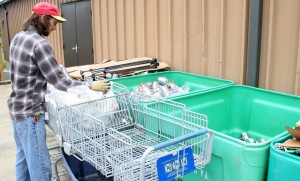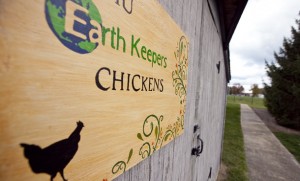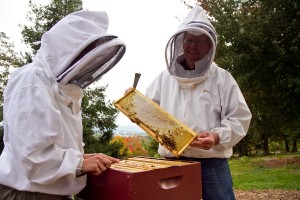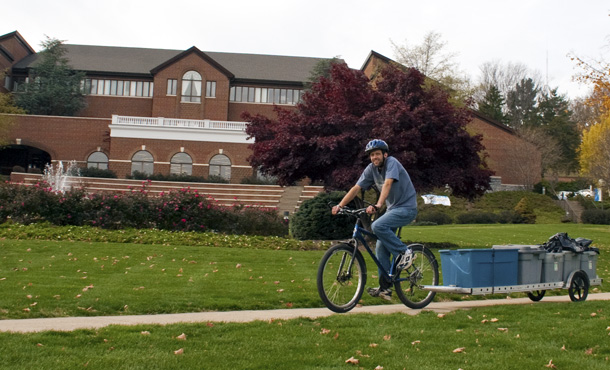On any given day at Eastern Mennonite University, you may see a young person riding a bicycle with an attached trailer piled with recyclables. The job represents a broad value woven through the fabric of university life: a commitment to sustainability.
EMU was among 173 schools nationwide named “2014 cool schools” by the Sierra Club, based on commitments to greening every level of their operations – from energy usage to recycling to food sourcing to curriculum.
“One of the things that makes EMU different is that sustainability at EMU is not just a grassroots effort,” said biology professor Jim Yoder in a recent interview with EMU news services. While there are certainly such efforts on campus, the commitment to sustainability has developed as a result of official EMU support.
Key step was staffing
The creation of a recycling coordinator position in 2005 was a big step along the way. Jonathan Lantz-Trissel, who held that position for five years until becoming EMU’s sustainability coordinator, worked to increase campus community awareness of recycling.
He started by tracking what EMU was already doing. He found the campus recycled about 20% of its waste. He and his work-study students introduced better signage about recycling, as well as new color-coded bins into residence halls, academic buildings and faculty offices to make proper waste disposal easy and convenient. Lantz-Trissel also included recycling education in the first-year orientation program. Now, nine years later, the percentage of waste that EMU recycles is closer to 50%.
As far as Lantz-Trissel knows, EMU is the only university that picks up recyclables entirely by bicycle. This came about through a cost-saving decision, he said, when the pickup truck used for recycling rounds needed a new clutch: “To replace the clutch was going to be $650. I said that for $550 I’ll get a bike and trailer and you can sell the truck.”
Recycling by bicycle

EMU agreed to give recycling by bicycle a try, although his supervisor was skeptical that it would last more than six months.
“EMU is the perfect size for using bikes and trailers,” said current recycling crew leader Matthew Freed. “The geography of the campus also helps considerably.”
Freed collects the majority of EMU’s recyclables from uphill sites, enabling him to coast down to where these need to be deposited for trucking away. “We actually don’t carry any heavy loads uphill…it’s mainly just good brakes to keep the loads from running away from us,” said Lantz-Trissel with a laugh.
The recycling crew consists of at least one work-study student who is always “passionate about what they are doing,” said Lantz-Trissel. “They like getting on a bike and peddling around recycling.”
Earthkeepers club
Besides the recycling work-study position, the heaviest student involvement with campus sustainability efforts comes from the environmental club Earthkeepers.
“We get volunteers to collect compost from the cafeteria Mondays, Wednesdays and Fridays,” explained co-president and senior Melinda Norris.

“You have to have people who are reliable,” in order for collecting compost via volunteers to work, said Lantz-Trissel. “I have never talked to another university who has students that have been that committed to composting…usually it ends up failing and people in the facilities end up handling it.”
Other Earthkeepers projects include providing clotheslines in residence hall laundry rooms, sponsoring Food and Farming Week (a week of cafeteria meals in the fall based around local, in-season foods), and installing timers on the campus tennis courts that turn the lights on for a designated time-frame.
In the spring semester, Earthkeepers helps the recycling crew in “Recyclemania,” an annual intercollegiate recycling competition. EMU has placed in the top 25% each year.
Presidential support
EMU President Swartzendruber sits on the board of the Evangelical Environmental Network and has signed the American College & University Presidents’ Climate Commitment statement.
Recently, EMU became one of the first 25 institutions of higher education in 10 states to commit to “Green Chemistry,” aimed at reducing or eliminating the use or generation of hazardous substances.
Perhaps the greatest testament to the EMU community’s commitment to increased sustainability, though, is the Quality Enhancement Plan, Peace With Creation: Environmental Sustainability from an Anabaptist Perspective.
“Each institution seeking reaffirmation of Accreditation is required to develop a Quality Enhancement Plan (QEP),” states the website for the Southern Association of Colleges and Schools Commission on Colleges. “The QEP describes a carefully designed and focused course of action that addresses a well-defined topic or issue(s) related to enhancing student learning.”
For EMU, that topic has been strengthening “care for God’s creation by enhancing our knowledge, values, and actions” and increasing “sustainable practices at the university.”
Campus-wide through QEP

The QEP “helps spread sustainability to students who would not necessarily be drawn to that,” said Yoder, a member of the Peace With Creation committee.
The plan moves sustainability beyond the committed students who are already on the bike collecting recyclables and in the cafeteria helping with composting. The plan invites the community as a whole to participate, with the faculty encouraged to weave sustainability lessons and themes through their curricula as much as possible.
Students are urged to bicycle or walk instead of driving locally. In recent years, they’ve help tend the university’s five beehives, four produce gardens, and dozens of fruit trees, with the results sometimes ending up in EMU’s dining hall.
For information on the full range of EMU’s sustainability efforts – including solar energy panels and LEED-certified residence halls – visit EMU’s webpage on sustainability.
